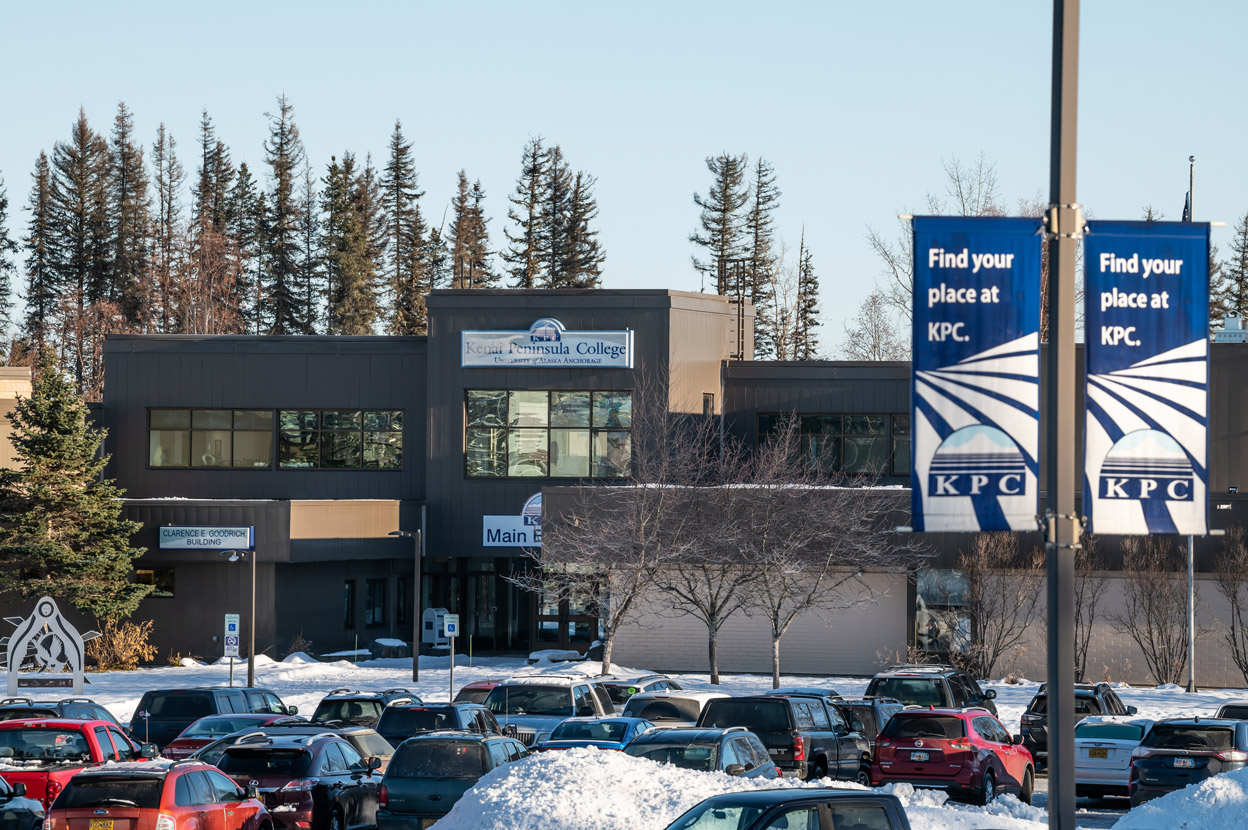Kenai Peninsula College celebrates 60th anniversary
by Ruby Glaser and Matt Jardin |

Kenai Peninsula College is celebrating its 60th anniversary this year and marked the occasion with an open house event, drawing more than 400 students, alumni, faculty, staff and community members. The day was filled with nostalgia and excitement, featuring a variety of activities and exhibits that highlighted KPC’s rich history and local impact.
The celebration kicked off with a reception for local partners and leaders, beginning with a warm welcome from KPC Director Cheryl Siemers, Ph.D., who reflected on the institution’s journey from its humble beginnings to becoming a cornerstone of higher education in the region.

UAA Chancellor Sean Parnell shared his remarks on this special occasion. Local politicians presented Director Siemers with a recent legislative citation honoring the decades of higher education and workforce development opportunities KPC has created for residents of the Kenai Peninsula.
Additionally, the event included campus tours, allowing visitors to explore the facilities and meet current faculty and students. Attendees enjoyed a visual timeline display showcasing the college’s history and evolution. Local food trucks, family-friendly activities and yard games added to the festive atmosphere.
The 60th anniversary celebration not only honored the past, but also looked forward to the future, by highlighting academic opportunities and continued community involvement. It was a memorable day that underscored the college’s enduring legacy and commitment to educational excellence.
KPC from 1963 to 2024
Throughout the last 60 years, KPC has grown from a small organization offering a handful of classes to local students to a multi-campus system serving more than 1,600 students each semester.
Founded in 1963, the Wildwood Air Force Base north of Kenai was the closest thing to a city on the Peninsula. Military students from the base were essential to the success of KPC’s first course offerings in February of that year. The city of Kenai, formed only three years after Alaska became a state, was required to be responsible for providing basic educational services for residents. The Kenai City School District (KCSD) selected a high school English teacher, Clayton Brockel, to direct the evening adult basic education courses that were held in the Kenai City schools. The first courses offered were college algebra, freshman English, elementary physical education and elementary science education.
In the summer of 1964, University of Alaska President William Wood notified the KCSD superintendent via telegram that the UA Board of Regents had unanimously approved the request to form Kenai Peninsula Community College.
Brockel began his tenure as KPC's first director in a part-time capacity only in the evenings. A year later, he became a half-time employee, and in 1966, he was consumed with the full-time task of putting the Peninsula's first college together. For the first three years, Brockel's office was his briefcase. He convinced Kenai Central High School to let him use a small closet as his first office.
In order to garner support for the developing college, Brockel spent most of his time traveling the Peninsula, talking to everyone he could about the benefits the college would bring. His mobile administrative office was his 1963 Chevy sedan, known as Ol' Blue. Anywhere a class was needed on the Peninsula, Brockel involved the new college in setting it up, finding an instructor to teach it, publicizing it and securing a location for it.
The college continued to grow, offering 16 classes in Kenai, Seward and Homer, serving around 200 students in 1966. By 1975, what is now known as KPC's Kenai River Campus (KRC) came into being with three buildings, a staff of 13 full-time and 29 part-time professionals and eight classified employees, including coordinators for the college in Seward and Homer. The property where KRC is located was donated by Clarence and Anna Goodrich and sits on the ancestral homelands of the Dena’ina peoples.
KPC's first degree, an Associate of Arts, was awarded in 1971 to Jack Hummel.
The Kachemak Bay Campus (KBC), originally known as the Homer Branch, offered classes coordinated by Brockel from the beginning. In 1976, Gail Ammerman earned the first Associate of Arts degree conferred in Homer. Ammerman became the coordinator at the Homer Branch and later served the college as an Advisory Board and College Council member. KBC first occupied rented space in 1982 and saw its first three graduates in 1984.
The college has also offered courses in Seward from the beginning and has now established the Resurrection Bay Extension Site (RBES), offering both community interest and general education required courses. The RBES has office space inside Seward High School and a full-time coordinator.
 "Kenai Peninsula College celebrates 60th anniversary" is licensed under a Creative Commons Attribution-NonCommercial 4.0 International License.
"Kenai Peninsula College celebrates 60th anniversary" is licensed under a Creative Commons Attribution-NonCommercial 4.0 International License.














